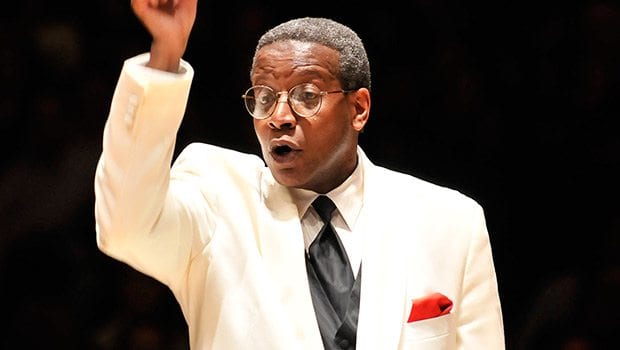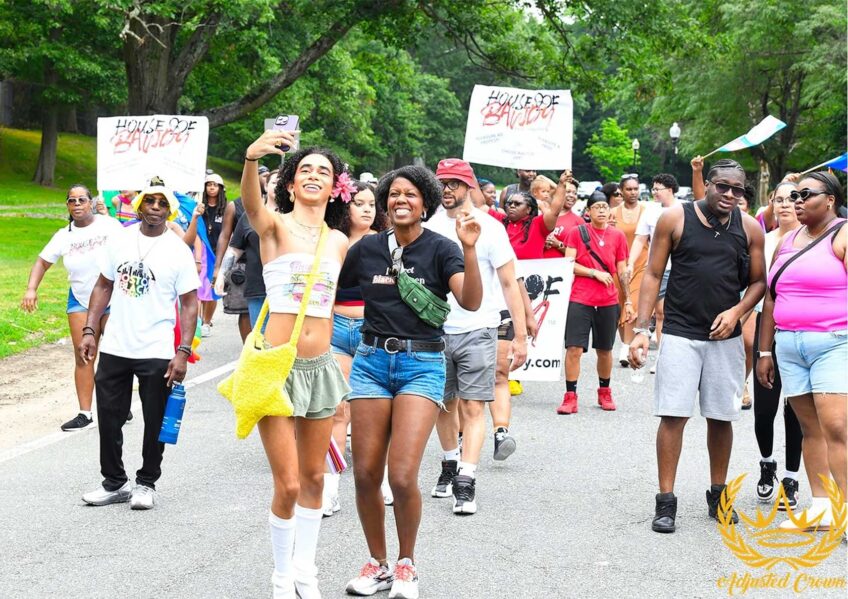
Gospel music arrived in the world on a wing and a prayer and great suffering as black Americans slowly surfaced from slavery and then out of the horrors of Jim Crow.
Produced from the secular sounds of post-emancipation blues and the Godly music derived from slave songs, gospel embraces the sacred, the lofty realm of religious concerns — calling ever the wayward to Jesus for the saving of their souls.
Among the few original American art forms, gospel stands out for its lyrical dynamism; its resonating reach upward; its preoccupation with the power of prayer; and its ability to lift the listener to the high ranges and pitches of ethereal awareness.
It springs — enigmatically — from what W.E.B. DuBois said were the “weird old songs in which the soul of the black slave spoke to men.”
“Gospel itself has always been on the edge of something in terms of having the ability include people…It says ‘Whosoever will, let him come,’” says Boston Symphony Orchestra Guest Conductor Charles Floyd.
On Saturday, June 14, at 6 pm, Floyd — a master at producing exquisite sound from world-class artists, and whose career thus far ranks him among the best among his peers and competitors — will explore the rich terrain of the spiritual canon as he leads the Boston Pops in its annual Gospel Night at Symphony Hall.
The genre, he says, begins with Thomas A. Dorsey, a once grief-stricken bluesman who, after confronted “by tragedy after tragedy,” found the resolve to write “Precious Lord, Take My Hand” a deeply emotive elegy later made famous by Mahalia Jackson during the 1950s.
Dorsey, who was then known as “Georgia Tom,” was the first to put black sacred song — its many metaphors, symbols, similes and tropes — to a decidedly juke joint beat.
Dorsey wrote over 3,000 gospel songs and was the centerpiece of “Say Amen, Somebody,” the excellent 1982 documentary explaining the long trajectory of the gospel music tradition — its inception and apogee.
“Gospel was very controversial when it started, and it remains so,” continued Floyd in an interview with the Banner this week. “The people who invented it were not necessarily religious. They were musically gifted people who came to explore religious music and made something…new of it. The music then captured the ear of the people who were used to hearing blues and jazz.”
Chicago-born, Floyd was “raised in the Baptist church” where his extraordinary talent for classical European music was often “in juxtaposition and in contrast” to the sacred music of the Northern black church familiar to him.
It is now Floyd’s 20th year directing the Gospel Night — which leads him to reflect on the upcoming performance.
“Gospel forced its own path from simple hymns and the [negro] spirituals…and it is primarily the genre of music from spirituals and jazz. It is a blend.”
If its earliest pioneer was Dorsey, the Moses of that music, then gospel had other developers, major and minor prophets — including songsters Della Reese and Clara Ward, black women suffering before and during the Great Depression — who helped popularize the music.
White composer Albert E. Brumley added well-known standard songs like “I’ll Fly Away,” “Turn Your Radio On” and “He Set Me Free.”
In the decades since, gospel has found the importance of change — continually stealing from the modern musical conventions of the generation: At one time gospel took the form of blues stylings, and then, successively, rhythm and blues, soul, rock and roll, and now rap.
Just go to YouTube and listen to Kanye West’s “Jesus Walks,” for yet another solid version of how gospel is so protean.
Floyd says Kirk Franklin brought gospel music to the Hip Hop generation — reflecting his times as much as other gospel trailblazers, including James Cleveland, Andre Crouch, Richard Smallwood and Walter and Edwin Hawkins.
“Kirk Franklin…has been successful at it…and has gotten [more] kids off the streets than any other gospel music,” he says.
At this year’s Gospel Night, Floyd will sample other sacred classical Europeans works, including Mendelssohn’s “War March of the Priest,” and Camille Saint-Saëns’ bacchanal “Samson and Goliath.”
The concert will include the a cappella group Take 6 and also features the world premiere of Floyd’s own work, “Song of Solomon,” a story taken from the Bible’s Old Testament. Solomon, an ancient Hebrew King, was considered the world’s wisest man who was said to possess 700 hundred wives and 300 concubines.
Floyd says the score, which will be accompanied by tenor vocalist Samuel Moscosco, reflects an evolved personal artistic creation “with bits and pieces of it that I‘ve been working on my whole life.
“It has its daring moments, yet I know it is something people will ultimately be comfortable with,” he added.
A musical prodigy who began learning piano at age four, Floyd performed his first staged solo recital before turning ten. He describes gospel music as restorative.
“The music gives you the sense to survive, …a sense of pride and self-esteem.”






